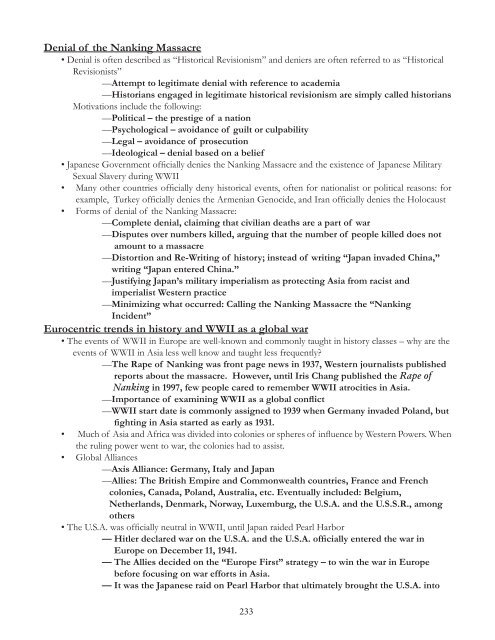Download - Canada ALPHA
Download - Canada ALPHA
Download - Canada ALPHA
You also want an ePaper? Increase the reach of your titles
YUMPU automatically turns print PDFs into web optimized ePapers that Google loves.
Denial of the Nanking Massacre<br />
• Denial is often described as “Historical Revisionism” and deniers are often referred to as “Historical<br />
Revisionists”<br />
—Attempt to legitimate denial with reference to academia<br />
—Historians engaged in legitimate historical revisionism are simply called historians<br />
Motivations include the following:<br />
—Political – the prestige of a nation<br />
—Psychological – avoidance of guilt or culpability<br />
—Legal – avoidance of prosecution<br />
—Ideological – denial based on a belief<br />
• Japanese Government offi cially denies the Nanking Massacre and the existence of Japanese Military<br />
Sexual Slavery during WWII<br />
• Many other countries offi cially deny historical events, often for nationalist or political reasons: for<br />
example, Turkey offi cially denies the Armenian Genocide, and Iran offi cially denies the Holocaust<br />
• Forms of denial of the Nanking Massacre:<br />
—Complete denial, claiming that civilian deaths are a part of war<br />
—Disputes over numbers killed, arguing that the number of people killed does not<br />
amount to a massacre<br />
—Distortion and Re-Writing of history; instead of writing “Japan invaded China,”<br />
writing “Japan entered China.”<br />
—Justifying Japan’s military imperialism as protecting Asia from racist and<br />
imperialist Western practice<br />
—Minimizing what occurred: Calling the Nanking Massacre the “Nanking<br />
Incident”<br />
Eurocentric trends in history and WWII as a global war<br />
• The events of WWII in Europe are well-known and commonly taught in history classes – why are the<br />
events of WWII in Asia less well know and taught less frequently?<br />
—The Rape of Nanking was front page news in 1937, Western journalists published<br />
reports about the massacre. However, until Iris Chang published the Rape of<br />
Nanking in 1997, few people cared to remember WWII atrocities in Asia.<br />
—Importance of examining WWII as a global confl ict<br />
—WWII start date is commonly assigned to 1939 when Germany invaded Poland, but<br />
fi ghting in Asia started as early as 1931.<br />
• Much of Asia and Africa was divided into colonies or spheres of infl uence by Western Powers. When<br />
the ruling power went to war, the colonies had to assist.<br />
• Global Alliances<br />
—Axis Alliance: Germany, Italy and Japan<br />
—Allies: The British Empire and Commonwealth countries, France and French<br />
colonies, <strong>Canada</strong>, Poland, Australia, etc. Eventually included: Belgium,<br />
Netherlands, Denmark, Norway, Luxemburg, the U.S.A. and the U.S.S.R., among<br />
others<br />
• The U.S.A. was offi cially neutral in WWII, until Japan raided Pearl Harbor<br />
— Hitler declared war on the U.S.A. and the U.S.A. offi cially entered the war in<br />
Europe on December 11, 1941.<br />
— The Allies decided on the “Europe First” strategy – to win the war in Europe<br />
before focusing on war efforts in Asia.<br />
— It was the Japanese raid on Pearl Harbor that ultimately brought the U.S.A. into<br />
233


